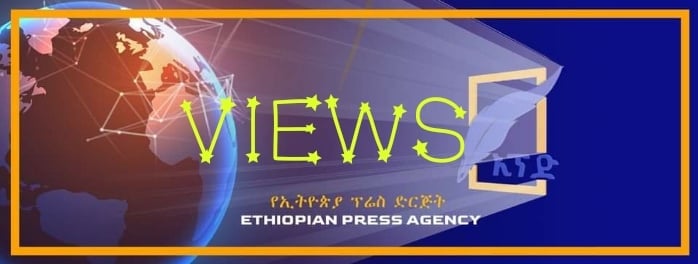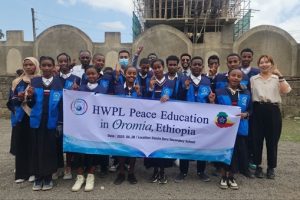
BY ABENEZER DAWIT LENCHA
In Ethiopia, political reforms of various sorts have taken place over the past years. In the historical continuum of the making and remaking of modern Ethiopia, the second half of the nineteenth century was shaped by the wars of incorporation and state formation on unequal terms. However, former reform attempts that take place in the history of Ethiopia had been hijacked or had lost their targets due to internal affairs and interventions from the outside, but not this time.
Nevertheless, few greedy governments from the west try to bring the long-term economic profit out of the Tigrian conflict that they reap from the escalation of wars and the establishment of dependencies that lasts for generations.
Generally, conflicts in any country may happen but, wars are escalated by those who want to create economic and political dominance within a specific period, and when the war finally comes into effect, they will provide support to sustain the war until a point where all the local economic sustenance are broken. Those countries with strong economic and production capacities and willing to maintain their economic dominance are interested to create, guide, and financing wars in countries and regions they intend to capture for their interest, market, and supply. When this is achieved, they finally will withdraw their support and negative peace comes at last like they do in Afghanistan.
In other words, during the times of war, they will provide you with cloth because your garment industry is not operating, that is after the war you will fall in love with their fashion and import clothing to keep your new-found fashion and this is the actual time to reap the economic seed of war, they have sowed.
Nevertheless, some western NGOs in Ethiopia with humanitarian missions tries to be a prominent player in the countries politics. They try to use humanitarian mission tools that do not depend directly on power politics although those NGOs try to provide military gadgets and equipment to those against the stability of the country, to achieve the wishes of their masters in the west.
Some NGOs are uniquely able to contribute by deploying ammunition and logistics that are supplied during times of war or any other economic incentives giving out to leaders, soldiers, and mercenaries in times of war, as they have increasingly done in recent years. They have promoted conflict by sponsoring and funding insurgents.
Moreover, it seems they are seeking to mitigate violence in the context of “complex humanitarian emergencies.” In many recent internal conflicts, humanitarian assistance has been systematically diverted and used to sustain their capacity to continue the violence. Humanitarian assets thus fuel rather than resolve the conflicts. Complex humanitarian emergencies are likely to continue even, their humanitarian cover will play an even larger role in the areas in which a security vacuum exists to use humanitarian aid as a weapon, if not they would not ask to bring satellite phones and other irrelevant instruments for Aid workers as we witnessed in recent days in Ethiopia.
Those Humanitarian NGOs have the intention to contribute inadvertently to the escalation of violence rather than to conflict resolution. The central role of these NGOs is to find ways of maximizing the negative externalities.
On the other hand, the US attempt of intervention in Ethiopian internal conflict is not to help a political community achieve liberation or prevent gross violations of human rights. Rather it is due to the project of reshaping political, social institutions, and balances their presence in the region with their rivals. However, aborting it in mid-stream could produce the worst in the Horn of Africa and all over the world at large.
More recently, there is a wrong moral presumption towards the war, and the insurgents are demonstrating that the war conditions are satisfying. But I think there is no moral presumption to keep the campaign. Precipitously ending a military operation may produce severe strategic and ethical costs, including the collapse of the war effort but, it may abort unnecessary humanitarian crisis.
That causes negative consequences for civilians; leaders have a responsibility to lessen the damage. Indeed, bargaining with immoral people and terrorists has to be tolerated if you can prevent the deaths of people still alive, you’re not doing a disservice to those already killed on both sides by trying to do so. Even if the war has thus far caused harm to civilians beyond what would have been considered proportionate at the start, it should necessarily be terminated. Besides, the TPLF should know the pre-war status quo will never be restored.
Nevertheless, victories in our context have to be achieving the government’s goals with a favorable cost/benefit analysis, discussions of war sometimes fall into the trap of depicting the outcome of the conflict in binary terms as a victory or defeat. But the outcome of the war lies on a spectrum.
To sum up, extricating a country from a quagmire in a just manner may be the greatest challenge in politics. The stakes are high: a lesser loss versus a greater loss can represent life or death for thousands or millions. First of all, leaders should recognize that the outcome of the war is not binary, or victory versus defeat. Instead, officials facing an unwinnable conflict must traverse a grey zone between triumph and disaster, seeking a lesser loss versus a greater loss, or the best peace possible. This will often be ugly stability or an imperfect order that protects core interests and values. Leaders should also note that the justice of a military campaign may be more fluid than is often thought.
To stress, the next time you go to war because you think some powerful hands that do not look like they are with you, like the terrorist TPLF does, think about this and think again. None of us is better than anyone of us; we are all as good as each one of us and it is only when we come to acknowledge this and come together as one, then we can all succeed and, I believe that Ethiopia is determined to build a nation; were respected, dignify, and support one another and our common interests are paramount.
In addition, The Ethiopian Reconciliation Commission that is established in 2019 has to come into the very influence along with other indigenous mechanisms to deal with past abuses and wartime crimes against civilians on both sides. However, the commission may defuse conflicts over the past through reconciliation, that is, by confessions of perpetrators and the commissions have to reach out to all victims, provide for their security, hold hearings in public, makes efforts to be fair in its process, and its report and invites the participation of all segments of society, including perpetrators.
Editor’s Note: The views entertained in this article do not necessarily reflect the stance of The Ethiopian Herald
The Ethiopian Herald September 2/2021



